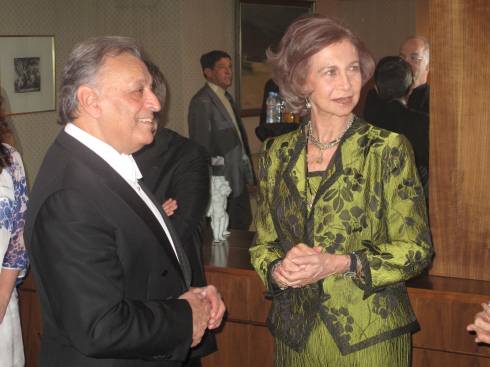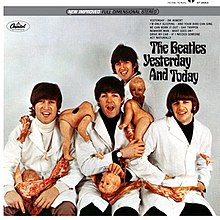When I went to hear the LSO last night they were all abuzz with what had happened the night before – the opening concert in the new hall of the home town of their principal flute and all-round ambassablogger, Gareth Davies.
Valery Gergiev was coming to Guildford, a dormitory town that last stirred, slightly, in the Blitz. It is a big occasion for the town. Publicans check their stocks. Department stores sellotape their windows (they can be loud, that band). The mayor puts on his chain of office and full regalia.

Concert starts, lovely performance, all smiles. Tchaikovsky Competition winner Daniil Trifonov is playing his heart out when, midway through the concerto, all the lights go out.

What’s an orchestra to do in the dark?

They play on. Just like on the Titanic. Or in the Blitz.
‘How could you play if you couldn’t see me?’ exclaimed Gergiev, later.
‘Ah, hah!’ said the LSO.
Here’s a taster of Gareth’s night out:
… It was all going terribly well until about two thirds of the way through when something rather unexpected happened. There was a pop somewhere over our heads and then the lights went out. All of the lights, stage, auditorium, foyer. 1086 people sitting in total darkness. Now occasionally things like this happen momentarily and then everything kicks into gear, the generator comes on, or the emergency lighting trips in. As this is normally what happens, after the gasp from the audience as their gala opening night started to go pear shaped, silence resumed as Daniil and the orchestra continued to play. You couldn’t see your hand in front of your face let alone the music or indeed the keyboard. The lights didn’t come back on. We carried on. A few people grabbed mobile phones out of their pockets and shone the dim screens on music. My phone was in my bag backstage. Gradually my eyesight got a little used to the dark and with the emergency exit signs in the hall being the only source left, I tipped my stand to illuminate it a little. The lights were still off. Dave Pyatt shone his torch app over as much of the woodwind music as he could and momentarily I could see. Unfortunately the torch suddenly cut out as he received a text message asking him to call his diary service. Darkness once more. We were still playing, Daniil skipping around the keyboard like nothing had happened. One member of the audience tried to stop us by starting to clap, but gave up as people shushed him. As it was now obvious the lights weren’t going to suddenly come back, Alan and Dan our stage managers came running on with small stand lights …
… continues here
Anna Netrebko, her husband and her best stage tenor of the moment are booked to warm up a key London venue ahead of next summer’s Olympics.
She’ll be appearing in London for the first time as a joint act with hubbie Erwin Schrott. Prime tenor Jonas Kaufmann makes up the pack at the Royal Albert Hall on June 6, brought together by the impresario Raymond Gubbay.
Several Olympics events will take place in the park across the road a few weeks later.

Here‘s where you book. Tickets £25-£185. Even more if you go to the touts.
Strasbourg stages the world premiere tomorrow of an opera about its most celebrated citizen.
It’s called La Nuit de Gutenburg and it honours the inventor of movable type, Johannes Gutenberg (usually spelled the German way), who spent a formative part of his adult life as a goldsmith in Strasbourg and has a central square named after him.

Gutenburg, who was born in Mainz, had a pretty turbulent time, getting driven out of one town after another by revolutions, spurned lovers and business dificulties. It seems surprising that Philippe Manoury is the first to choose him as the subject for an opera.
And to do it just as the print media he invented are finally becoming obsolescent.

More details and pictures here.
My friend Katya hangs out with the hard crowd.
Round about the time the cock is clearing its throat, she took this pic of the maestro having a little private ruminate on the piano.

Later on, when the LSO blogger gets his act together, I’ll tell you what Valery did when all the lights went out.
At the Tchaikovsky Competition this summer, the Brazilian legend Nelson Freire walked off the piano jury with, one other member told me, ‘a face like a shroud’. He was seriously ill, and Valery Gergiev was deeply concerned.
Last night Gergiev conducted Freiere at the opening of the London Symphony Orchestra season at the Barbican, with sensational results. Freire, seldmom heard in London in recent years, gave a performance of Brahms’s second piano concerto, that called Arthur Rubinstein to mind. Both sit quite still at the piano and let their fingers do the walking.
Freire has an attitude of introspection that invites the listener into his sound world. The playing is light with few heavy fffs and there are sparkles of Rubi-like mischiefs of rubato that keep the orchestra alert. But the seriousness of purpose is unmistakable and the performance unforgettable.
The small, humble virtuoso seemed embarrased by the subsequent ovation. Gergiev had to give him a friendly push in the back to propel him once more into the limelight for a glittering ovation – a rare, unnamed, airing of a melody from Gluck’s Orfeo.
Nelson’s back, and the world is all the better for that.

photo: Benjamin Ealovega
The Israel Philharmonic Orchestra ends its European tour tonight in Verona, before returning home for the Jewish New Year.
The only disruption to its concerts was in London. Other pro-Pal actions promised elsewhere failed to materialise. In Spain, Queen Sofia attended their concert (pic’d here with Zubin Mehta).

What can we conclude? Not much, except that London now has the best organised anti-Israel mob in Europe (possibly excepting Oslo) along with the most receptive left-wing media for encouraging concert disruptions. Last week, Charlotte Higgins in the Guardian warned that the London Philharmonic, which suspended four players for anti-Israel statements, ‘will have only itself to blame’ if its concerts are ‘disrupted by protests’.
The Guardian is effectively inciting further attacks on live orchestral concerts, is it not?
He’s a sistema graduate, 27 years old, and he’s just been named chief conductor by the Stavanger Symphony Orchestra, in Norway. His name is Christian Vasquez. Bookmark it.
Here’s the agent’s bio and promo pic.

Stavanger, Norway’s oil capital, will get a brand new concert hall next year. Christian could be on a roll.

Ever since Gustavo Dudamel made the first breakthrough, half a dozen sistema conductors have launched careers on the international foothills, among them Diego Matheuz, Carlos Izcaray (presently at Wexford Opera), Ana María Raga and Ilyich Rivas. Who’s next?
The paper I posted recently about the effects of ovulation on the singing voice – studied in three countries from the perspective of heterosexual males – looks like a good candidate for the year’s least coveted international awards, the Ig Nobel Prizes.
Defined as ‘improbable research (which) makes people laugh and then think’, its recent laureates include a team who perfected a helicopter method of collecting whale snot, another which confirmed ‘the widely held belief that searing relieves pain’ and a third, from the University of Bristol who discovered that Fellatio by Fruit Bats Prolongs Copulation Time.
The 2011 award ceremony at Harvard will be shown online here. Seven genuine Nobel winners will present the awards, following the world premiere of a mini-opera, Chemist in a Coffee Shop.
My Shanghai translator, Dr Yun Sheng, has been visiting a panda reservation where curators attempt to persuade the shy and stubborn creators to change their timeworn habits and get breeding. She sent me these stunning pictures.
No particular reason for sharing them, except – why did they remind me of symphony orchestras? Oh, add your own metaphors…



Fiona Maddocks, in her Observer review today of Mieczyslaw Weinberg’s opera, applies a careful – though by no means cautious – distinction between masterwork and masterpiece. She argues that The Passenger is a major work by a master-composer without ever quite convincing the critical spectator that is belongs to the elite cadre of deathless masterpieces.
It’s an important view, and one that I respect and am inclined to share. On the other hand, exactly the same could have been said of Shostakovich’s Lady Macbeth of Mtsenk between its first presentations in the 1930s and its ultimate acclamation 70 years later. I need to see The Passenger again. I have a feeling it will grow and grow.

John Allison, in the Sunday Telegraph, describes it as ‘one of the most unflinching engagements … ever made’ with a Holocaust theme. he gave it five stars. His Telegraph colleague Rupert Christiansen dismissed it with two.
The Editor of the Jewish Chronicle hated every minute of it. All are signs that the work needs time to settle.
The death of Robert Whitaker has been reported. He was 71.

Whitaker caught Brian Epstein’s eye when the group toured Australia in 1964 and he was giving an interview for Jewish News. “I photographed Epstein, saw he was a bit of a peacock and a cavalier, and put peacock feathers around his head in photographic relief, ‘ Whitaker related. ‘He was knocked out when he saw the picture. After that, he saw an exhibition of collages I had at the Museum of Modern Art and immediately offered me the position of staff photographer at NEMS, photographing all his artists. I initially turned it down, but after seeing The Beatles perform at Festival Hall I was overwhelmed by all the screaming fans and I decided to accept the offer to return to England.”
He shot several iconic images

incuding the Hard Day’s Night cover

and another cover, the so-called Butcher’ Cover that was pulled before it reached the USA:

Here’s an Art Network obit.
(all images (c) the estate of Robert Whitaker, all rights reserved)

Erin Keefe.
She’s 31 and she’s been named top fiddle in the Twin Cities.
Congratulations.





















